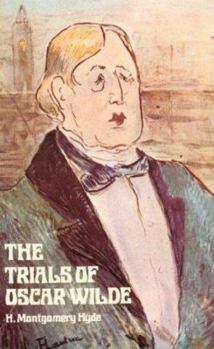Book Overview
Exhaustively researched, exciting, definitive account of trials, with all their fireworks and catastrophe, plus lengthy chapters on background and aftermath. This description may be from another edition of this product.
Format:Paperback
Language:English
ISBN:048620216X
ISBN13:9780486202167
Release Date:June 1973
Publisher:Dover Publications
Length:368 Pages
Weight:0.95 lbs.
Dimensions:0.8" x 5.4" x 8.5"
Customer Reviews
1 rating
Closer to the Man
Published by Thriftbooks.com User , 20 years ago
As Ellmann writes in his magisterial biography, the name of Oscar Wilde is synonymous with delight. What better place to search for hitherto unreported aphorisms and bon mots than in the transcripts of his two trials--the one in which he sued the Marquis of Queensbery [my deliberate mispelling, to get back at this man for "somdomite"], Bosie's father, and the one in which he himself was accused of immorality? Since much of the interest in Wilde, as in Fitzgerald and Plath, is in his extraordinary life, this book should be a primary source.If you feel as I do, you will not be disappointed with H., Montgomery Hyde's account. This is not a compilation of dazzling wit, yet wonderful ripostes break out amidst the legal tedium, the inexorable process that led to Wilde's imprisonment. The appendices and Hyde's comments add significantly and are remarkably free of editorializing.A devoted reader of Ellmann's biography will immediately see that Ellmann relied on H. Montgomery Hyde. From a personal acquaintance who in the 1960's met Hyde at Northwestern University, where Ellmann taught, I have learned that the two knew each other well. Ellmann's conclusions about Wilde's syphilis derive in part from Hyde. His precis of the trial is a reduced version of Hyde's full presentation. *The Trails of Oscar Wilde* brings the reader closer to Wilde (as seen by Hyde)--to the man whose force of personality gained him a devoted, usually sympathetic following. The personality is crucial. To Andre Gide, Wilde said, "I have put my talent into my work and my genius into my life [my translation]." Max Beerbohm, among others, claimed that Wilde's conversation was a supreme delight. W. H. Auden judged that except in his masterpiece *The Importance of Being Earnest* Wilde was primarily a performer, not an artist. This book brings the reader closer to that personality, that performer, made all the more moving by the reader's knowing, as the participants could not, what the consequences of his inquisition would be.In honesty I must add that I read this book in a hardcover version published by William Hodge and Company in June 1948. I have not seen the Dover Books edition. Because it has the same title, it is doubtless the same as the one I know. It will be a treasure for the devotee.





